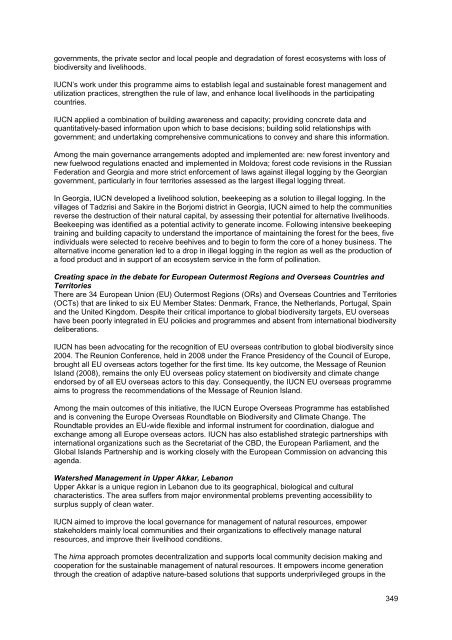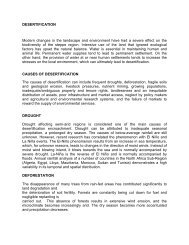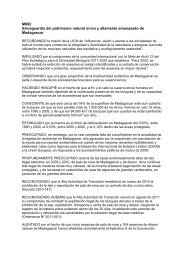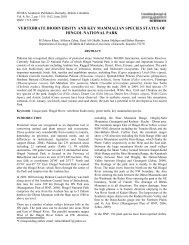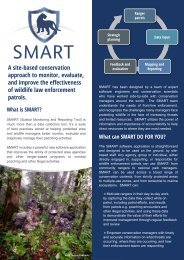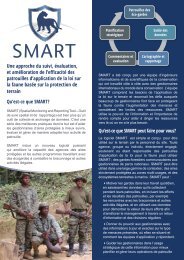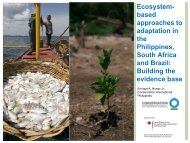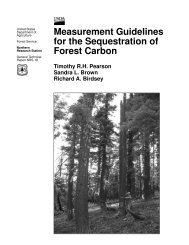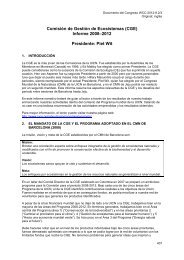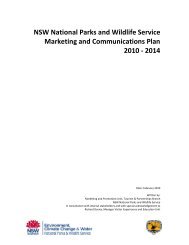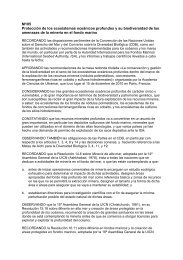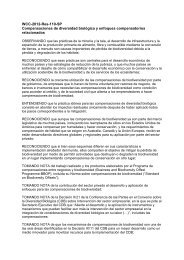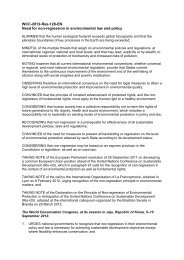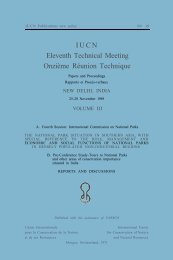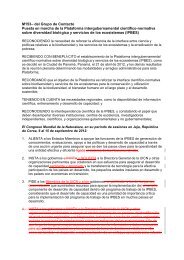Create successful ePaper yourself
Turn your PDF publications into a flip-book with our unique Google optimized e-Paper software.
governments, the private sector and local people and <strong>de</strong>gradation of forest ecosystems with loss ofbiodiversity and livelihoods.<strong>IUCN</strong>’s work un<strong>de</strong>r this programme aims to establish legal and sustainable forest management andutilization practices, strengthen the rule of <strong>la</strong>w, and enhance local livelihoods in the participatingcountries.<strong>IUCN</strong> applied a combination of building awareness and capacity; providing concrete data andquantitatively-based information upon which to base <strong>de</strong>cisions; building solid re<strong>la</strong>tionships withgovernment; and un<strong>de</strong>rtaking comprehensive communications to convey and share this information.Among the main governance arrangements adopted and implemented are: new forest inventory andnew fuelwood regu<strong>la</strong>tions enacted and implemented in Moldova; forest co<strong>de</strong> revisions in the RussianFe<strong>de</strong>ration and Georgia and more strict enforcement of <strong>la</strong>ws against illegal logging by the Georgiangovernment, particu<strong>la</strong>rly in four territories assessed as the <strong>la</strong>rgest illegal logging threat.In Georgia, <strong>IUCN</strong> <strong>de</strong>veloped a livelihood solution, beekeeping as a solution to illegal logging. In thevil<strong>la</strong>ges of Tadzrisi and Sakire in the Borjomi district in Georgia, <strong>IUCN</strong> aimed to help the communitiesreverse the <strong>de</strong>struction of their natural capital, by assessing their potential for alternative livelihoods.Beekeeping was i<strong>de</strong>ntified as a potential activity to generate income. Following intensive beekeepingtraining and building capacity to un<strong>de</strong>rstand the importance of maintaining the forest for the bees, fiveindividuals were selected to receive beehives and to begin to form the core of a honey business. Thealternative income generation led to a drop in illegal logging in the region as well as the production ofa food product and in support of an ecosystem service in the form of pollination.Creating space in the <strong>de</strong>bate for European Outermost Regions and Overseas Countries andTerritoriesThere are 34 European Union (EU) Outermost Regions (ORs) and Overseas Countries and Territories(OCTs) that are linked to six EU Member States: Denmark, France, the Nether<strong>la</strong>nds, Portugal, Spainand the United Kingdom. Despite their critical importance to global biodiversity targets, EU overseashave been poorly integrated in EU policies and programmes and absent from international biodiversity<strong>de</strong>liberations.<strong>IUCN</strong> has been advocating for the recognition of EU overseas contribution to global biodiversity since2004. The Reunion Conference, held in 2008 un<strong>de</strong>r the France Presi<strong>de</strong>ncy of the Council of Europe,brought all EU overseas actors together for the first time. Its key outcome, the Message of ReunionIs<strong>la</strong>nd (2008), remains the only EU overseas policy statement on biodiversity and climate changeendorsed by of all EU overseas actors to this day. Consequently, the <strong>IUCN</strong> EU overseas programmeaims to progress the recommendations of the Message of Reunion Is<strong>la</strong>nd.Among the main outcomes of this initiative, the <strong>IUCN</strong> Europe Overseas Programme has establishedand is convening the Europe Overseas Roundtable on Biodiversity and Climate Change. TheRoundtable provi<strong>de</strong>s an EU-wi<strong>de</strong> flexible and informal instrument for coordination, dialogue an<strong>de</strong>xchange among all Europe overseas actors. <strong>IUCN</strong> has also established strategic partnerships withinternational organizations such as the Secretariat of the CBD, the European Parliament, and theGlobal Is<strong>la</strong>nds Partnership and is working closely with the European Commission on advancing thisagenda.Watershed Management in Upper Akkar, LebanonUpper Akkar is a unique region in Lebanon due to its geographical, biological and culturalcharacteristics. The area suffers from major environmental problems preventing accessibility tosurplus supply of clean water.<strong>IUCN</strong> aimed to improve the local governance for management of natural resources, empowerstakehol<strong>de</strong>rs mainly local communities and their organizations to effectively manage naturalresources, and improve their livelihood conditions.The hima approach promotes <strong>de</strong>centralization and supports local community <strong>de</strong>cision making andcooperation for the sustainable management of natural resources. It empowers income generationthrough the creation of adaptive nature-based solutions that supports un<strong>de</strong>rprivileged groups in the349


